
Policy framework for meter taxis vital
By Ranil WIJAYAPALA
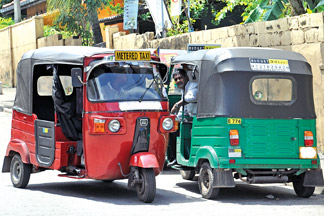 |
|
Metered three-wheelers |
When you stand opposite Regal cinema hall or opposite Lake House in
Colombo expecting a three-wheeler to reach your desired destination
whether to Pettah, Town Hall, Kollupitiya, Borella or Bambalapitiya you
may come across quite a number of three-wheelers to attend to your
services. But these days you may prefer to travel in a metered taxi
rather than getting into a non-metered taxi.
Unlike in the past, the city of Colombo is now filled with metered
taxis and they are now invading even the three-wheel parks in the city
though meter taxi concept emerged to get three- wheelers on the streets
rather than sticking them in three-wheel parks to be on the street
expecting hires.
May be you prefer metered three-wheelers to non-metered three-
wheelers as you always prefer not to be drawn into an argument or
bargaining with the taxi drivers at the end of your journey over the
taxi fare as many three-wheel drivers used to ask for more at the end of
the journey. Therefore, many people mostly welcomed the entry of metered
taxis to the streets voluntarily by the three- wheel operators
themselves.
Though meter taxis are not a novel thing to Sri Lanka, the history of
the metered three-wheelers does not go beyond 2005 despite the fact that
three-wheelers were introduced to Sri Lanka in 1978. According to the
President of the All Island Three-wheel Drivers Union, Lalith
Dharmasekara, the first digital fare meter to the country was introduced
to Sri Lanka in 2005 by Thejasiri Gunatilleke a businessman based in
Kandy.
It was exactly on January 15, 2005 the first metered three- wheeler
entered to the streets in Colombo after Kelum Jayasumana, from Galpotta
Road, Kotahena fixed the first fare meter in his three-wheeler.
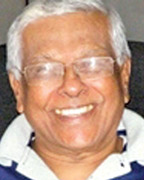 |
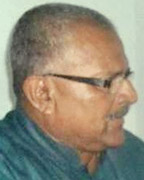 |
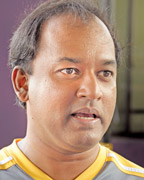 |
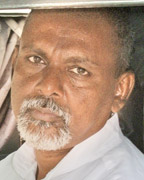 |
| Upali de Silva |
Lal Kalinga |
Thushara Kariyakarawana |
Lalith Dharmasekara |
After a few years Upali de Silva from the Lisvin Trading Company
imported some 20 fare meters to Sri Lanka and they were distributed
among three-wheel operators in Colombo National Hospital area, Navam
Mawatha, Wellawatta and Bambalapitiya.
"It was with the firm belief that the Government would make it
compulsory to have fare meters for three-wheelers, that the businessmen
imported those fare meters. But it never became a reality and even the
businessmen were discouraged and stopped importing the fare meters",
Dharmasekara said.
Later, another attempt was made by Dr. Kumar Rupasinghe along with
Kelum Jayasumana, the first three wheel operator who fixed a fare meter
to a three-wheeler, by importing 100 fare meters from India and
distribute them among the three-wheel operators.
Thereafter, three wheel operators banded themselves to popularise
fare meters among three-wheel operators amidst heavy opposition from the
normal three-wheel operators who preferred to run their services without
adopting any justifiable fare mechanism.
When the locally produced fare meter was introduced by Link Lanka
pioneered by Thushara Kariyakarawana, three years back the fare meters
started to become more popular among three wheel operators.
"At the beginning the fare meters were fixed to charge Rs.50 for the
first kilometre and Rs.28 from the second kilometre.
We used to encourage three wheel operators to fix fare meters for
their three-wheelers as we needed to run this service in a fair and
justifiable manner," Dharmasekara added.
But things were complicated with the fluctuating fuel prices in the
country. When the price of one litre of petrol hit Rs.157 the fare
meters were readjusted to charge Rs. 32 per kilometre retaining the
charge for the first kilometre Rs.50 as it is.
The fluctuating fuel prices have made it impossible for the three
wheel operators to maintain a standard fare as the charge for one
kilometre. "Things went out of our control also as three-wheel operators
demanded that the fare for one kilometre should be adjusted according to
the fuel price hike", Dharmasekara added.
Things started to change from then as fare meter fixing companies had
to comply with the demand of the three-wheeler operators as they lost
their businesses. Once they refused the demands of the three-wheel
operators to fix the rates according to the wish of the operator, the
number of fare meter importers also increased gradually.
|
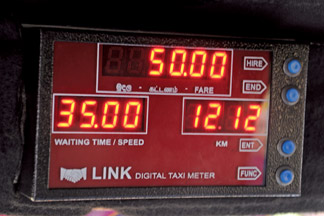
A fare meter |
This situation has led to so many discrepancies in the fare metered
three wheel operators as they used to change the fare meters according
to their wish. Today, the situation has worsened as they opted for many
tactics to mislead the commuters boarding their three-wheelers.
Therefore, the people who get into the three-wheelers had to first
inquire how much they charge per kilometre after the first kilometre. At
a time when people have to think twice even to spend Rs.20 due to
soaring cost of living, people are naturally keen to know how much they
are spending for their daily travel.
As fare meters are adjusted according to the wishes of the three
wheel operator, people who used to travel on metered three-wheelers also
had to pay different amounts for the same journey on the same route they
travel on a daily basis; thus, meter taxis are becoming a nuisance.
This has not only become a nuisance for the people who travel in
three-wheelers but also for the metered three-wheel operators running
their service charging a fair amount.
"This situation has posed a danger for the metered three-wheelers
itself as people look at these metered taxis suspiciously when three
wheel drivers are charging different fares. Now there are taxis which
charge Rs.40 per kilometre," Lalith Dharmasekara added.
Under these circumstances people had to be extra careful when they
get into metered three-wheelers without checking how much they charge
for one kilometre.
But this has also become a difficult task for the people as
three-wheel drivers used to switch on the meter before the commuter gets
into the three-wheeler to mislead the passenger as the meter indicates
only 0000 on the meter at the beginning. Only after the end of the first
kilometre that people realise the exact amount they charge after the
first kilometre.
"People should ask the driver about the charge per kilometre before
they get into the three-wheeler though it indicates that it is a metered
taxi", Dharmasekara added.
Apart from this, three-wheel drivers also opted to change the time of
the meter to fix it to the night mode enabling them to charge 15 percent
higher compared to the day time charge. But this happens only in the
three-wheelers fixed with fare meters in which time can be adjusted.
But people can avoid being caught by such tactics by asking the
three-wheeler drivers to show the time before they switch on the fare
meter.
Dharmasekara also added, though they have not come across
meter tampering by any three wheel operator he will not rule out the
possibility of them changing the calibration adjusting the fare meter to
charge the fare for one kilometre for 900 metres.
But the companies fixing fare taxi meters say that they also don't
have any option other than complying with the three-wheel operators
since there is no law with regard to the taxi fare meters in Sri Lanka.
But they totally denied any involvement in tampering the fare meters as
they also want to popularise the fare meters among three wheel operators
to provide a better service to the people.
Link Lanka, the leader in the fare taxi meters in Sri Lanka which
started fixing locally developed fare meters among taxi operators says
that they always ensure that the fare meter is fixed in a most
scientific manner.
Director of Link Lanka, Thushara Kariyakarawana told the Sunday
Observer that they manufacture fare meters locally after developing
electronic circuit and the software locally to be fixed in the
three-wheelers as well as other cab services.
"At the initial stages we fixed fare meters to charge Rs.50 for the
first kilometre and Rs.30 per kilometres beyond the first kilo metre.
With the increase of fuel prices three wheel operators demanded that the
fare should be changed. We had to comply with their demand as they got
other places to fix fare meters according to their requirement",
Kariyakarawana added. "This we had to do because there was no law
available in Sri Lanka to monitor this process and control the fare
charged by the three wheel operators per one kilometre. But we can
assure that the fare meters we fix are tamper proof ones", he added.
He said once they fix the fare meters they check the calibration
after having a trial run within a kilometre. "Only once we assure that
the meter is appropriately fixed only we release them", he added.
If there is any possibility to tamper the meter through radio
frequencies or from other electronic devices also we have taken steps to
avoid them by having sound filters in the device, he added.
"We have more than 50 dealers islandwide and once they fix the fare
meters they automatically become our dealers islandwide and provide
after sale services also", he added.
"The problem here is that we can assure that the meters we fix are
quality ones and tamper proof. But we cannot assure that all the fare
meters imported to the country are of the same quality.
That is why we also request the authorities to bring in legislations
to have a price control and to check the quality of the meters imported
to Sri Lanka, as very cheaper quality fare meters are also available in
the market at present", Kariyakaravana added.
Upali de Silva from the Lisvin Trading which import fare meters to
the country also said that they are particular about the price
adjustment in the fare meters as three-wheel operators demand that their
meters should be adjusted according the price they want.
"Earlier we used to fix the fare meters enabling them to charge Rs.
32 or 35 from the second kilometre onward. Now three-wheeler operators
are demanding to alter it for higher fares", de Silva who is also the
pioneer in introducing digital ticket machine to Sri Lanka said.
"At the beginning we fixed these fare meters in consultation with the
Three-Wheel Operators Association. But later, we also had to comply with
demand of our customers. In this process what we can do is only to get a
letter from the three-wheel operator saying that they are going to
display the fares they are going to charge from the people. They do give
letters, but they can easily ignore them once they are back in the
streets", he added.
"We can stick to one fare if there are any rules and regulations to
monitor this process. But unfortunately there is no such law in this
country to check the quality of the fare meters imported to Sri Lanka or
any monitoring mechanism to fine the three-wheel operators who are
charging an undue amount from the people," he added.
According to available statistics and estimates there are around
735,000 three-wheelers operating all over Sri Lanka with more than
200,000 three-wheelers added to its population along in the past two
years.
According to Lalith Dharmasekara around 500,000 three-wheelers are
catering to the transport needs of the people and out of that more than
40,000 are having fare meters.
"This is a huge amount and the number itself says that it needs more
attention from the Government. As three-wheel operators, we feel the
requirement to have monitoring and regulatory mechanism for the
three-wheel passenger services in the country as some unruly three-wheel
operators are trying to ruin this industry for short-term profits", he
added.
From the people's side there is a necessity of having a monitoring
and regulatory mechanism for the three-wheeler passenger services as
they don't have a place to go once they are subjected to injustices by
the three-wheelers, whether it is over fare or any other issue.
Not that there has been efforts by respective Governments to regulate
the industry by bringing regulatory mechanisms but unfortunately they
have not been implemented at all.
Since private passenger transportation purely comes under the
Provincial Councils according to the 13th Amendment to the Constitution
of Sri Lanka, the Western Provincial Council made certain efforts way
back in 2002 passing laws to establish a Bureau for Three-wheel Services
under the Road Passenger Transport Authority.
Although the legislation was gazetted on February 20, 2003 that never
came into effect due to opposition from some quarters of three-wheel
operators.
However, the same legislation was amended in 2008 when Reginald
Cooray was the Chief Minister of the Western Provincial Council and 27
regulations were gazetted on November 21, 2008 enabling the Western
Provincial Council to interfere with the affairs of the service provided
by the Three-wheel operators. That also had comprehensive regulations to
streamline the three-wheel services.
But that also never came into effect and the implementation was
further postponed due to protests by certain quarters of three-wheel
operators and also by politicians.
"Today there is no one to supervise this sector and it is running
without any laws to control and also without any aim though it provides
a vital service to the country as a whole", Dharmasekara added.
Despite all these facts the services rendered by three-wheel
operators are expanding further with the introduction of more
three-wheel taxi services in more organised manner.
President of the Association of Sri Lanka Meter Taxi Services, Lal
Kalinga said they are open for new changes to provide better services to
the people by introducing modern technology enabling people to get
access to the services even through mobile phones.
"We need to further streamline our services to the public and for
this we need the help of the Government by bringing regulations to
monitor whether these three-wheel operators are providing a fair service
to the public. Only that way we can strengthen three-wheel service in
the country", he added.
To address all these issues the Private Transport Service Ministry is
now working with the Three-wheel Operators Unions and Associations to
work out a policy framework for the three-wheel industry. So far several
rounds of discussions have been conducted in this regard to launch this
policy very soon.
Private Bus Transport Minister C.B. Ratnayaka told the Sunday
Observer that his Ministry aims to formulate this policy soon though it
is a subject that comes under Provincial Councils. "We are hoping to
finalise this policy soon", he said. |

